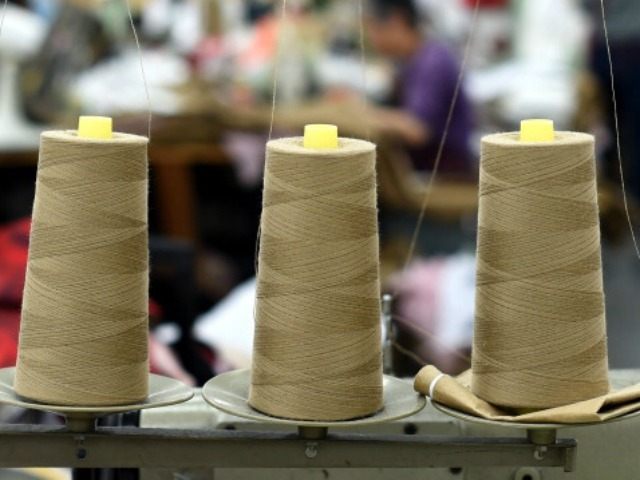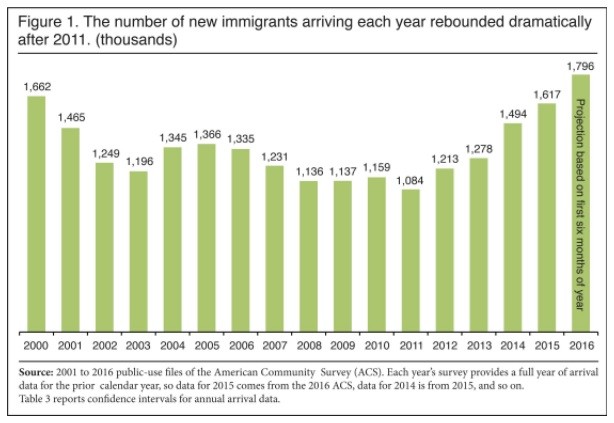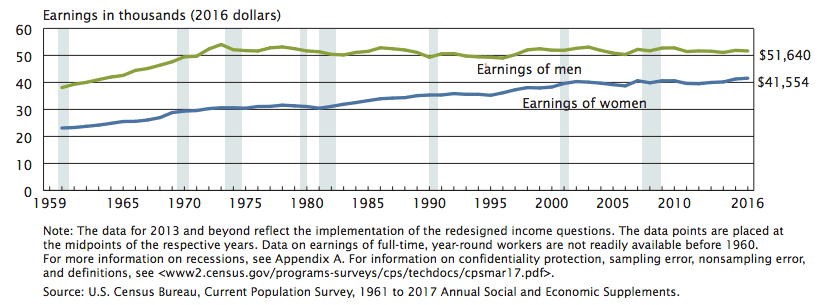American garment workers are reaping the benefits of President Trump’s economic nationalism which seeks to tighten the labor market to increase U.S. wages.
As Breitbart News reported, average hourly wages jumped 2.9 percent compared to last January, much higher than originally expected, while the unemployment rate dropped to an 18-year low at about 4.1 percent.
For the roughly 116,000 U.S. garment workers and clothing manufacturers, Trump’s economic nationalism has translated to wage growth of about 14 percent on average.
Economists and analysts told CNN that the wage increases for garment workers were likely due to businesses having to raise wages in order to retain workers in the industry as immigration enforcement is vastly stricter under Trump and former President Obama.
CNN reported:
“The job market is very tight and getting tighter,” said Mark Zandi, chief economist with Moody’s Analytics. “Businesses are struggling to hire or hang onto people so they have no choice but to raise wages.” [Emphasis added]
…
“These are people who are very skilled. And I’m sure it’s very difficult to hold onto those workers,” said Zandi. He added that the industry also has a high percentage of foreign born workers.
“I’m sure the crackdown on immigration is having an impact in that sector,” he said, forcing manufacturers to pay their remaining workers even more. “This is only the beginning. It’s going to get a lot worse.” [Emphasis added]
Sen. Tom Cotton (R-AR)—Trump’s closest populist ally in the U.S. Senate—also attributed the positive economic news and wage growth to immigration controls, where deportations of illegal aliens living in the U.S. increased 37 percent after Trump signed his Enhancing Public Safety in the Interior of the United States Executive Order five days after being inaugurated.
Cotton, along with Sen. David Perdue (R-GA), introduced legislation in 2017 that would further raise Americans’ wages by reducing the current mass legal immigration levels, where more than one million mostly low-skilled legal immigrants enter the U.S. every year, putting downward pressure on working and middle class Americans’ wages and job opportunities.
Cotton and Perdue’s “RAISE Act,” which was endorsed by Trump, would reduce legal immigration from more than 1 million immigrants arriving a year to about 500,000 a year. At the same time, the RAISE Act would shift the current legal immigration system from one that prioritizes high-skilled, English-proficient immigrants over those with low-education rates and minor skills.
Multinational trade agreements and globalization devastated fashion manufacturing production in the U.S.
Over the past two decades, fashion manufacturing jobs in the U.S. have declined by more than 80 percent, dropping from about 900,000 jobs in 1990 to just 150,000 jobs in 2011, the Bureau of Labor Statistics reports.
Just two years after the federal government enacted the North American Free Trade Agreement (NAFTA), companies laid off a total of 706 American workers from fashion manufacturing jobs in the U.S., with 67,511 workers initially filing for unemployment. Between 1996 and 2011, companies laid off an average of 323 American workers every year in the fashion manufacturing industry.
In that same period, American workers in textile mills suffered an average of 200 layoffs per year. In 1996, some 1,040 American workers in the clothing, textile, and leather manufacturing industry were fired from their jobs.
Every year the U.S. admits more than 1.5 million foreign nationals, with the vast majority deriving from family-based chain migration, whereby newly naturalized citizens can bring an unlimited number of foreign relatives to the U.S. In 2016, the legal and illegal immigrant population reached a record high of 44 million. By 2023, the Center for Immigration Studies estimates that the legal and illegal immigrant population of the U.S. will make up nearly 15 percent of the entire U.S. population.
Mass legal immigration to the U.S., like Koch brothers-supported free trade agreements, has come at the expense of America’s working and middle class, which has suffered from poor job growth, stagnant wages, and increased public costs to offset the importation of millions of low-skilled foreign nationals.
For blue-collar American workers, mass immigration has not only kept wages down, but in many cases, decreased wages, as Breitbart News reported. Meanwhile, the U.S. continues importing more foreign nationals against whom working-class Americans are forced to compete. In 2016, the U.S. brought in about 1.8 million mostly low-skilled immigrants.
For white-collar American workers, mass immigration has become a tool for the big business lobby, cheap labor industry, and Silicon Valley elites to replace U.S. citizens with cheaper foreign workers. For example, as Breitbart News reported, 71 percent of tech workers in coveted high-paying, white-collar Silicon Valley jobs are foreign-born, while the tech industry in the San Francisco, Oakland, and Hayward area is made up of 50 percent foreign-born tech workers.
The growing foreign-born population dominating the workforce in Silicon Valley comes as nearly 500,000 Americans graduate in the STEM fields every year. Overall, four million young Americans enter the workforce every year, but their job opportunities are further diminished as there are roughly two new foreign workers for every four American workers who enter the workforce.
Median earnings of full-time, year-round workers, 15 years and older, 1960 to 2016.
The massive importation of low-skilled foreign nationals to the U.S. has translated to a cheap labor economy that has aided in keeping American mens’ wages stagnant for at least 44 years, as Breitbart News reported. Median earnings for American men working full-time were actually lower in 2016 than they were in 2007.
John Binder is a reporter for Breitbart News. Follow him on Twitter at @JxhnBinder.




COMMENTS
Please let us know if you're having issues with commenting.